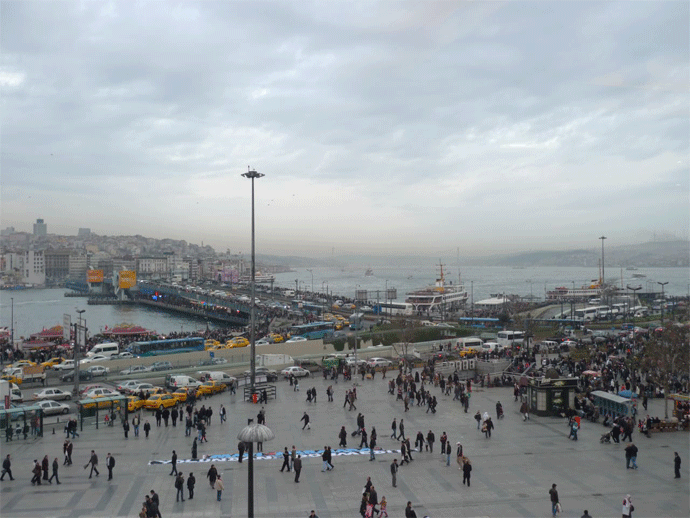Istanbul, as the reactors fume.

I came to the top of the entrance to the passageway under the waterfront highway. A stream of humanity emerging. Two covered women carrying a baby stroller, ballooned in their robes. A man selling flashlight cigarette lighters and plastic skeletons. An electric toy for children—an endless stream of tiny penguins climbed up a ladder and slid down a convoluted chute only to start again. Among the crowd of olive and pink faces was a single African. Streams of migrations, transforming faces, all the nations selling plastic toys, knock-off shoes, Chinese T-shirts, used cell phones, coming and going from work, school, mosque, church, home, shop, market, public office, train station, factory, cafe, restaurant, and we all fused, living within sight of peak humanity, peak oil, the trams rattling overhead, buses and cars, machines traveling underground, expansion, development. The bombs that had gone off weeks before, the uprisings, the fire and water spreading, the wicked meanderings of the stock market, the winds heading across the ocean—all of it was an expression of what we wanted. We could all trade faces and see each other everywhere. We here were among plastic rifles and teddy bears hung by their throats in the underpass—the covered women, the pink tourists, the invisible Alawi and their secret rites, the African who’d seen his village burned, his family scattered, who’d crossed continents at great risk only to find himself selling watches near water infested with jellyfish, where men from the east struggled to while away the hours and perhaps feed their families pulling tainted fish out of the exhaust of the ferries.
The last Greeks still heading to church after centuries of conquest, persecution, war, pogroms, the dervishes still laying hands on each other chanting the name of the divine in Pentecostal ecstasy, the transgendered women, heads held high, heading out for another night of rough trade. We were all magnetized by a common point. We were all there together surrounded by pregnant streetcats and the debris of the crowd. Because it drew us, somehow: our petty struggles were diluted and finally united into a growl from our collective throat—the time we were living through. And with that we all made our way to wherever we were going, me up the hill to my house, my arms loaded with cups and bottles and bags and coffee grounds, until I could finally drop it all on the formica counter and sit still watching an enormous hull heading north through the straits.
1 Comment
-
I think it’s one of the handful of places where you can feel the crush of the multitude in istanbul, another being istiklal and taksim. The rest of the city divides into narrow sidewalks that divert the crush into small streams of people shouldering past each other. I feel like it’s a city that resists the great crowds.